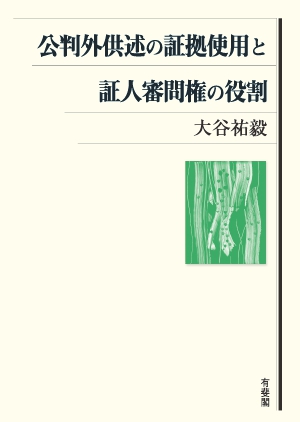
Title
Kohangai-kyoujyutsu no Syoko shiyou to Syonin-shinmon-ken no Yakuwari (Admissibility of Out-of-Court Statements in Criminal Procedure and the Right to Cross-Examine Witnesses)
Size
472 pages, A5 format, Hardcover
Language
Japanese
Released
April, 2022
ISBN
978-4-641-13956-5
Published by
Yuhikaku
Book Info
See Book Availability at Library
Kohangai-kyoujyutsu no Syoko shiyou to Syonin-shinmon-ken no Yakuwari
Japanese Page
Along with the growing emphasis in recent years on direct examinations and oral proceedings, there was a call to move away from overreliance on interrogations and written statements when revisions were made to the Code of Criminal Procedure and related laws and regulations in 2016. Likewise, current judicial precedents and practice are shifting toward clarifying and tightening the interpretations and applications of the hearsay exception rule. Additionally, new avenues for using out-of-court statements are being explored. For example, in relation to so-called forensic interviews, there has been a call to create new legislation on admissibility of oral recordings and videos of the interviews of victims and others.
Despite this, however, it cannot be said that there has been sufficient theoretical study in Japan recently that encompasses the full context of the admission of out-of-court statements as evidence. In particular, there has been little meaningful debate on the right of the accused to cross-examine all witnesses that is guaranteed in Article 37, paragraph 2 of Japan’s Constitution, which is rarely discussed in any significant way, except in arguments concerning the unconstitutionality of the hearsay exception rule as it pertains to individual cases. It is worth noting that this stagnation of review and discussion has continued for some time.
If we look at other countries, in the U.S., where this legal principle originated, there was a major case law change in 2004, and in the European Court of Human Rights, there have been a number of precedent-setting cases in recent years that have sparked substantial discussions in various European countries. It is regrettable that these trends in other countries have not led to any significant debate within Japan.
In an attempt to rectify this situation and restimulate discussion, this book seeks to provide a new theoretical perspective on the right to cross-examine witnesses within the context of out-of-court statements used as evidence by referring to the latest trends in the U.S. and Europe and extracting universal findings that transcend differences in national legal systems.
Specifically, this book develops an argument that differs from conventional arguments by distinguishing between the objective of guaranteeing the reliability of statements and the objective of guaranteeing sufficient evaluation of reliability—a distinction that has not always been clear—and concluding that the latter objective is the central purpose of cross-examining witnesses. In other words, as regards the right to question witnesses—unlike the conventional argument supporting the hearsay exception rule that justifies the use of out-of-court statements as evidence in exceptional cases by ensuring to some degree the reliability of such evidence—the focus is on whether it is possible for a fact-finder to sufficiently evaluate the reliability of statements. And this focus in turn leads to the conclusion that sufficient elements must exist to enable a more robust evaluation of the reliability of out-of-court statements.
How successfully this argument is presented herein can only be evaluated by the reader, but I will be happy if this book makes some contribution to furthering the debate of the issue within Japan.
(Written by: OTANI Yuki / August 29, 2022)
Related Info
The 2nd UTokyo Jiritsu Award for Early Career Academics (The University of Tokyo 2021)
https://www.u-tokyo.ac.jp/ja/research/systems-data/n03_kankojosei.html




 eBook
eBook